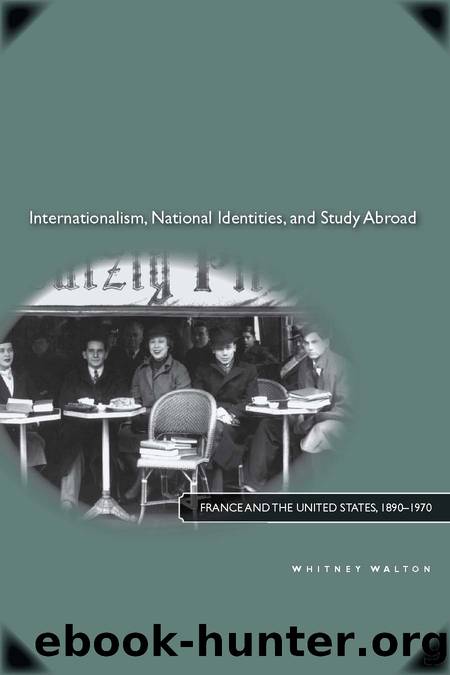Internationalism, National Identities, and Study Abroad by Walton Whitney;

Author:Walton, Whitney;
Language: eng
Format: epub
Publisher: Stanford University Press
Published: 2011-07-27T00:00:00+00:00
FIGURE 7 Class of 1951, junior year abroad in France. Photographer/creator: Wide World Photo. © Wide World Photo. Smith College Archives.
Studentsâ accounts reveal an appreciation for new ways of being, new possibilities for identity that they learned from being in France. In her letters to her mother, Miriam Halbert commented repeatedly on the French emphasis on pleasures of the mind, in contrast to American materialism, as well as on the capacity simply to enjoy life: âI can remember the time when I would have thought it a waste of time to spend two hours just walking. Some people donât take time out to live. I think Iâve learned it over here.â85 The father of a Smith College student visited the juniors in Paris and wrote this open letter to all parents of juniors in France in 1949, suggesting how the experience affected their daughters: âToday she is the âforeignerâ who has to make her way with people who donât know her language and customs. She is meeting foreigners not only who sell fruit but who paint pictures, study in famous schools and are perhaps a little better educated than she is. It is both an exhilarating and somewhat humbling experience. She will return to America with a much broader tolerance and a better understanding of the human race and its problems. Sheâll no longer be a snob.â86 According to French reporter Henriette Nizan in 1950, American students came to France precisely to experience a different way of being: âThey all seem to have understood that there is more than one way to be happy on this earth, that neither comfort, money, or technical progress are sufficient to assure happiness, . . . that what counts, for man, is not so much the conditions of his well being as his capacity to be happy. And that, they learned in France.â87
French students and teachers who studied or worked in the United States often remarked on the warm welcome they received, an immediate friendliness and hospitality that was unusual in French culture. A French intern wrote in 1956 of his experience working in the University hospitals in Madison, Wisconsin: âwhat struck me the most upon my arrival at the hospital is the great friendliness with which I was welcomed. All the doctors, whatever their rank, put themselves out to facilitate my adaptation to social life as well as to medical activities.â88 In 1958 forty-five students and two professors from the National Electrotechnical, Electronics and Hydraulics College of Toulouse, traveled to the United States and Canada. In a report of the visit, the travelers professed to initial apprehensions about the language barrier and the awkwardness of being strangers in private homes. But the hospitality of the families surprised the engineers and allowed them to share comfortably in daily life: âIt was this spirit of cordiality and good will, completely natural and unforced, which allowed us to adapt ourselves to situations which, in France, would generally have required hours in order to become acquainted. The
Download
This site does not store any files on its server. We only index and link to content provided by other sites. Please contact the content providers to delete copyright contents if any and email us, we'll remove relevant links or contents immediately.
The Vikings: Conquering England, France, and Ireland by Wernick Robert(82472)
Ali Pasha, Lion of Ioannina by Eugenia Russell & Eugenia Russell(40239)
The Conquerors (The Winning of America Series Book 3) by Eckert Allan W(37380)
The Vikings: Discoverers of a New World by Wernick Robert(36971)
Cecilia; Or, Memoirs of an Heiress — Volume 1 by Fanny Burney(32544)
Cecilia; Or, Memoirs of an Heiress — Volume 2 by Fanny Burney(31939)
Cecilia; Or, Memoirs of an Heiress — Volume 3 by Fanny Burney(31928)
Empire of the Sikhs by Patwant Singh(23070)
The Secret History by Donna Tartt(19041)
Hans Sturm: A Soldier's Odyssey on the Eastern Front by Gordon Williamson(18566)
Cat's cradle by Kurt Vonnegut(15330)
Pimp by Iceberg Slim(14481)
Sapiens: A Brief History of Humankind by Yuval Noah Harari(14361)
Talking to Strangers by Malcolm Gladwell(13344)
Norse Mythology by Gaiman Neil(13343)
Leonardo da Vinci by Walter Isaacson(13315)
4 3 2 1: A Novel by Paul Auster(12369)
Underground: A Human History of the Worlds Beneath Our Feet by Will Hunt(12085)
The Radium Girls by Kate Moore(12013)
